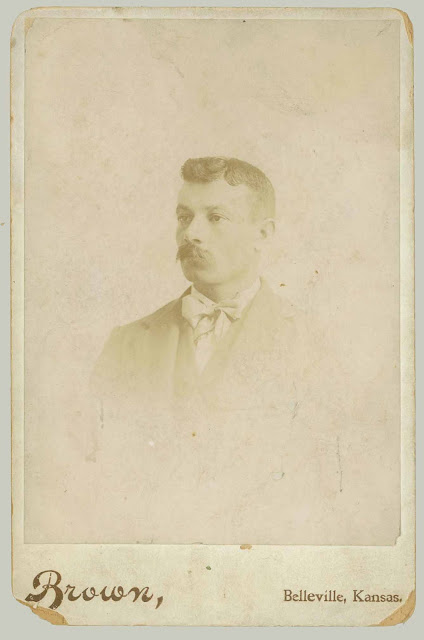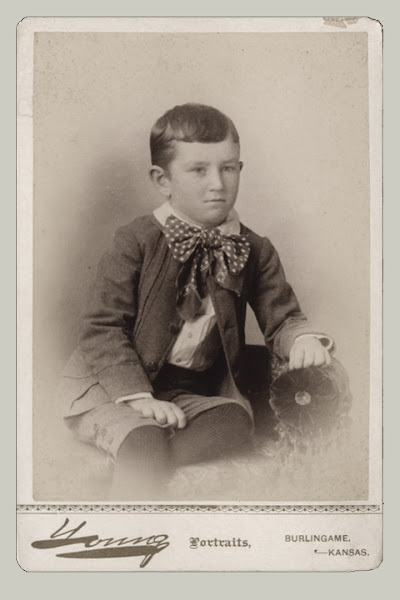Included on this special set of pages are Cabinet Card examples from just one state, Kansas. A sort of index. They are presented here in alphabetical order according to location.
Why Kansas?
In 1865, when the Cabinet Card size for photo mounts began its popularity, Kansas had only been a state for 4 years. Even today there are more than 400 towns with a population less than 400. Back then, even more. Where a Cabinet Card carries the name of the photographer and the town where he was working, the dates of city incorporation will be one clue to the date of the cabinet card.
Cabinet Cards were so popular and well known that in some photographer’s newspaper ads of the era, they were referred to merely as “Cabs”.
Cabinet Cards were so popular and well known that in some photographer’s newspaper ads of the era, they were referred to merely as “Cabs”.
Most say they eventually surpassed the popularity of the Carte de Viste format. See a brief history of the Carte de Viste.
Photographers often lived and based in a larger town and “worked” the neighboring smaller towns monthly or weekly. The passenger trains were very handy back then.
Where further information on a photographer is known, a link will be provided.
The central purpose in these pages is to help place a date on cabinet cards done by various photographers in various places. Here’s hoping you spot a card design or imprint that will help you date and identify that card in your collection.
These pages are for educational and informational purposes only. Any helpful suggestions are welcomed.
Kansas Cities, Towns, Burgs and Whistlestops in the late 19th century.
Promoting the care, understanding and collection of this unique format of 19th century photography. They are more than 100 years old. Handle with care.
Some examples on this page have been enhanced or restored for clarity
and presentation here.
This page is free for educational and research purposes only but, as
always, if the original owner of any of these examples objects to the
use on this page, just let me know and they will be immediately
removed.
See also:
Owlcation is an excellent site which examines the Kansas photographers of the 19th century. Follow the link
Baldwin City began as a trail stop on the Santa Fe Trail named Palmyra. The small community consisted of a harness shop, blacksmith, hotel, lawyer, drug store, two doctors and a tavern. A main benefactor of the community was John Baldwin and the town was named in his honor. Baldwin City was incorporated on September 22, 1870.
N J Metz worked in Baldwin, Kansas, (and the area) for only a short time. He apparently started in April of 1899 and left for California in July of 1906.
Baldwin (KS) Baker Orange -29 Mar 1899
Baldwin (KS) Ledger -
20 Jul 1906
Lewis E Wehe operated in Carbondale, Scranton and Baldwin, and other smaller towns in Kansas, from about 1885 to 1894. He then apparently established a gallery in Topeka, KS, but moved at least twice, He also continued to operate in small nearby towns. In 1930 he was living and working in Newton, KS, but by 1931 he was back in Topeka. He died in 1938.
Topeka, KS
example from auction site
(Note: Topeka, kS, is just 42 Miles from Baldwin, KS)
For more examples of L F Dobler, see THIS PAGE: L F DOBLER
Beloit, KS
example from the Flickr collection of mj aux
(According to newspaper items, W H Greenwood opened a studio in Beloit, KS, Jan 1882 and closed Jan 1888.)
Bird City was founded in 1885. It was named for Benjamin Bird, a cattleman. The surrounding area was originally used predominately for livestock grazing.
Bird City was a station and shipping point on the Chicago, Burlington and Quincy Railroad.
In 1872, Blue Rapids was incorporated as a city of third class under the statutes of Kansas.
Blue Rapids, KS
example from Photographer's Net
(established 1890)

photographer: Miller
Miller's Cottage Studio
Blue Rapids, KS
example from ForgottenFacesForgottenPlaces
Burlingame, KS
example from Kansas Memory
Probably C J Snyder out of Topeka, KS, just 40 miles north. Many towns were often connected with a direct rail line in those times.
Obadiah Faqua Young
(1854-1832)
O F Young was a photographer in Burlingame, KS, from March of 1890 to January of 1893.
In 1893, Young and his family moved from Burlingame to Chicago, IL. He was photographer in Chicago only a short time, beginning a career in sales and moving to Oak Park, IL. He died in Oak Park in 1932. He was buried in Burlingame, KS, although curiously, he had only lived in Kansas a short time.
Cabinet cards by Young can be clearly dated to between March, 1890, and January, 1893.
Burr Oak was laid out in 1871, and it was incorporated as a city in 1880. It was named from the Burr Oak Creek.
The first post office in Burr Oak was established in June 1871.
Burr Oak, KS
example from contributor
M P Creese appears to have been based in Burr Oak, KS, and worked also in near-by Mankato, KS periodically.
More examples in the Mankato, KS, collection.
Not the one you were looking for? Here's the photographer's
INDEX by name.
All the Cabinet Card photographers of the 19th
century found in LOST GALLERY are listed there.
Cabinet cards typically have the photographer’s name and address printed on the bottom edge or the reverse of the card. 19th century photographers moved around a lot. The basic idea here is to find WHEN a photographer was WHERE, which will help date an unidentified CABINET CARD from your family album.
This is a work always in progress.
Aditional information and New examples are always welcome. Any
additional information will help narrow the time that these precious
antiques were made.
All submissions should be free of glare and
shadows.
Do not crop.
Leave a border around each card. The edges are
sometimes an important clue to the age of the card.
Email to the address found in the profile at the bottom of this page.
Some examples on this page have been enhanced or restored for clarity
and presentation here.
This page is free for educational and research purposes only but, as
always, if the original owner of any of these examples objects to the
use on this page, just let me know and they will be immediately
removed.













































No comments:
Post a Comment